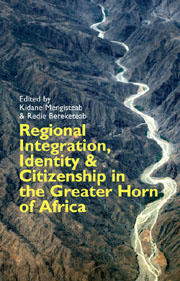Book contents
- Frontmatter
- Contents
- List of Tables, Figures & Appendices
- Notes on Contributors
- Acknowledgements
- List of Acronyms
- Part One RELEVANCE OF INTEGRATION TO IDENTITY AND CITIZENSHIP
- 1 Relevance of Regional Integration in the Greater Horn Region
- 2 Re-conceptualizing Identity, Citizenship and Regional Integration in the Greater Horn Region
- 3 A Diversity Perspective on Identity, Citizenship and Regional Integration in the Greater Horn of Africa
- Part Two CRITICAL FACTORS IN INTEGRATION
- Part Three LESSONS FROM SELECTED AFRICAN INTEGRATION SCHEMES
- Index
- EASTERN AFRICAN STUDIES
3 - A Diversity Perspective on Identity, Citizenship and Regional Integration in the Greater Horn of Africa
from Part One - RELEVANCE OF INTEGRATION TO IDENTITY AND CITIZENSHIP
Published online by Cambridge University Press: 05 February 2013
- Frontmatter
- Contents
- List of Tables, Figures & Appendices
- Notes on Contributors
- Acknowledgements
- List of Acronyms
- Part One RELEVANCE OF INTEGRATION TO IDENTITY AND CITIZENSHIP
- 1 Relevance of Regional Integration in the Greater Horn Region
- 2 Re-conceptualizing Identity, Citizenship and Regional Integration in the Greater Horn Region
- 3 A Diversity Perspective on Identity, Citizenship and Regional Integration in the Greater Horn of Africa
- Part Two CRITICAL FACTORS IN INTEGRATION
- Part Three LESSONS FROM SELECTED AFRICAN INTEGRATION SCHEMES
- Index
- EASTERN AFRICAN STUDIES
Summary
INTRODUCTION
Integration, applied to any society, means the incorporation of disparate ethnic, linguistic, and religious groups of a population into a unified whole. In other words, an integrated society is one that provides equal opportunity for all groups, so that no one group is denied access to education, employment and ownership of property by reason of their ethnicity, religion or national origin (Encarta).
Evidence abounds that integration, whether at country level, as in the example of the USA, or regional level, as in the example of the EU, can improve the socio-economic development of member groups. However, as Mengisteab points out in his Concept Paper, most African regional integration entities such as IGAD are not achieving their potential (Mengisteab, 2009: 1). This concept paper nicely underlines the complexity of regional integration within the context of the Greater Horn of Africa region. I would contend that to really enhance our depth of understanding of the factors underlying the complex context of the Horn of Africa, we need to examine how diversity dimensions, such as ethnic, gender, linguistic and religion, were exploited by all post-colonial African states, the Horn of Africa being no exception. At the dawn of independence, newly independent African states became replicas of the oppressive colonial state. These repressive states then embarked on nation-building agendas that were narrowly defined and created ethnic hierarchies within states, where one identity group heavily controls the executive arm of the state. This in turn leads to states that lack broadbased consensus from their various identity groups.
- Type
- Chapter
- Information
- Publisher: Boydell & BrewerPrint publication year: 2012



